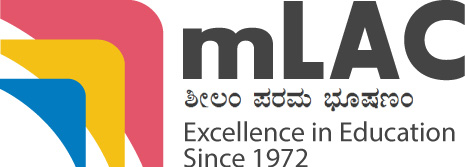MLACW (now mLAC) is an institution of excellence located strategically in the vicinity of national institutes of repute, such as Indian Institute of Science, Institute of Wood Science & Technology, National Institute of Advanced Studies, Raman Research Institute and Central Power Research Institute.
News & Events
View All >>
About
Department of SanskritMISSION : To teach Samskrita language in a way that promotes language, tradition and culture of creativity to prepare students to suit most efficiently to understand the needs of society, industries, teaching and higher education for positions of leadership and lives of service.
VISION: To collaborate with other academic, research and government academies to strengthen the education and research and help students to face challenges in the field of literature and competitive authorities
The Department of Samskrita was established in the year 1973. The department offers skill development programmes for students through Sambhashana Samskritam, Vyavahrika Samskritam and Subhashitani. The department strives to motivate students by creating opportunities to effectively utilize the various teachings In Samskrita Kavyas and fostering a reading and learnign culture amongst them.
The department hosts several Literary competitions in Samkrita like debate, esssay writing, rasa prashna,recitation, memory test of Samkrita names and creative writing. Samkrita games are also organised periodically in the classrooms. We encourage all the students to actively participate in them. The department also host "Samskrita and Science" theme based exhibitions.
The department strives to ensure that the students emerge out as good human beings and good citizens of the nation by inculcating the values and idelogies reflected in Samskrita literature. The department upholds the idea of Vishwabandhutva.
Syllabus
| Title | Year | Download |
|---|
Course Outcome
Sanskrit Course Outcome - View Document
Reports
| Title | Year | Download |
|---|



